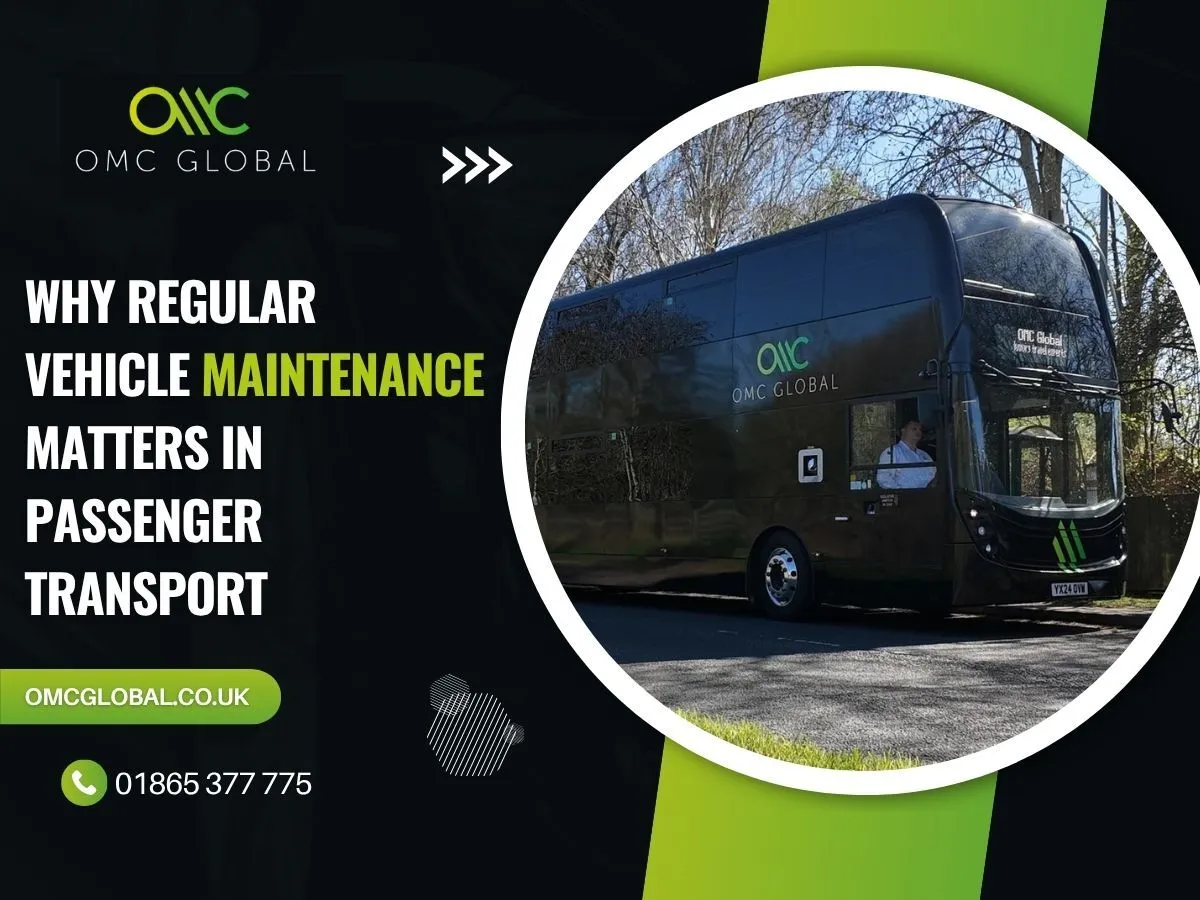Why Regular Vehicle Maintenance Matters in Passenger Transport


For passenger transport businesses, vehicles are not just assets; they are the backbone of the service. Whether you're running a taxi fleet, a bus company, or a private chauffeur service, keeping your vehicles in top condition is crucial. Not only does it ensure your operations run smoothly, but it also builds trust with your customers, guarantees safety, and improves overall efficiency.
This blog explores the crucial role of regular vehicle maintenance in the passenger transport industry. From enhancing passenger safety to boosting profits, we will discuss how routine upkeep can be the key to long-term success.

When it comes to safety in passenger transport, cutting corners is not an option. Neglecting regular maintenance can lead to catastrophic failures, putting both passengers and drivers at risk. Here's why safety should always be your top priority:
Mechanical issues like brake malfunctions, tyre blowouts, or engine failures can happen unexpectedly. Regular maintenance checks and routine servicing help identify and address these issues before they escalate.
For instance:
According to the UK's Department for Transport, vehicle defects are responsible for a significant number of road accidents every year. Simple actions like replacing worn windscreen wipers or ensuring proper alignment can improve visibility and vehicle handling, directly reducing the risk of accidents.
Passenger transport vehicles must adhere to strict regulatory standards. For example, Public Service Vehicles (PSVs) in the UK need to undergo regular MOT tests and routine checks to stay compliant. Skipping maintenance could result in penalties or even loss of operating licences

For businesses in passenger transport, time truly is money. A vehicle that breaks down en route can disrupt schedules, lead to customer dissatisfaction, and hurt your bottom line. Regular maintenance can significantly minimise these issues.
Preventative maintenance, such as replacing components nearing their end of life, can help keep your fleet running smoothly. For example:
By addressing these small issues before they turn into major problems, you can avoid costly disruptions and ensure uninterrupted service.
A well-maintained vehicle operates more efficiently, consuming less fuel and delivering better mileage. For instance:
This increased efficiency not only saves money but also contributes to your commitment to a sustainable and environmentally friendly service.
Vehicles are a significant investment for any transport business. Proper maintenance can extend the lifespan of your fleet, making the most of your capital expenditure. A vehicle in good working condition suffers less wear and tear, remaining operational for far longer than one that's neglected.
Passenger transport businesses thrive on customer satisfaction. Happy customers are likely to return and recommend your service, making regular maintenance essential to meeting their expectations.
Imagine being a passenger in a taxi or bus where the air conditioning doesn’t work, or the seats are uncomfortable. Regular upkeep ensures your vehicles are in excellent condition, providing a smooth and pleasant experience for passengers.
Key considerations include:
Delayed pickups or arrivals are often deal-breakers for customers in the passenger transport industry. Maintenance practices such as pre-trip inspections and adhering to a regular service schedule reduce the likelihood of delays, helping maintain punctuality.
Customers are more likely to trust and choose a transport service that prioritises safety. Promoting the fact that your vehicles are regularly inspected and meet all safety standards will reassure passengers that they’re in capable hands.

Regular vehicle maintenance isn’t just about spending money; it’s about saving money in the long haul. Proactive upkeep helps transport businesses avoid the steep costs associated with repairs, fuel inefficiency, and downtime.
Identifying and addressing minor issues early prevents them from escalating into costly repairs. For example:
A poorly maintained vehicle burns through fuel more quickly. Proper maintenance, such as tuning the engine and keeping tyres inflated, ensures your vehicles consume fuel as efficiently as possible.
Skipping maintenance can lead to legal complications, especially for businesses that require certifications like MOT (Ministry of Transport) or CPC (Certificate of Professional Competence). Such oversights can lead to fines or even the suspension of operational licences.
Eventually, you may want to upgrade your fleet. Well-maintained vehicles fetch higher resale prices than poorly kept ones. Detailed service records showing regular maintenance can further boost their market value.

Your vehicles are a visible representation of your brand. Regular maintenance shows that your business cares about quality, safety, and customer satisfaction.
A clean, well-maintained fleet represents a professional and reliable operation. This can significantly impact how potential customers perceive your brand, especially in competitive markets.
Consumers today are increasingly drawn to companies that prioritise sustainability. A well-maintained vehicle fleet produces fewer emissions, making your operation more eco-friendly and appealing to environmentally conscious passengers.
For corporate clients or long-term customers, showcasing your commitment to maintaining your fleet can inspire confidence and establish long-term partnerships.
Implementing an effective maintenance schedule is the final piece of the puzzle for ensuring your business reaps the many benefits of regular upkeep.
Consider partnering with reputable service providers for routine maintenance, which can ensure high standards and reduce the burden on your team. Additionally, advanced fleet management software can help you stay on top of maintenance schedules and streamline your processes.
Regular vehicle maintenance is not just an operational necessity; it’s a strategic investment in safety, efficiency, and customer satisfaction. By maintaining your fleet, you demonstrate professionalism, reduce costs, and set your business up for long-term success.
At OMC Global, regular vehicle maintenance isn’t just something we do, it’s how we uphold our promise of safe, smooth, and stress-free travel. By keeping our fleet in top condition through routine checks and servicing, we ensure that every journey meets the highest standards of safety and reliability.
Because for us, maintenance is more than a checklist, it’s a commitment to our passengers, our partners, and the trust they place in OMC Global every single day.